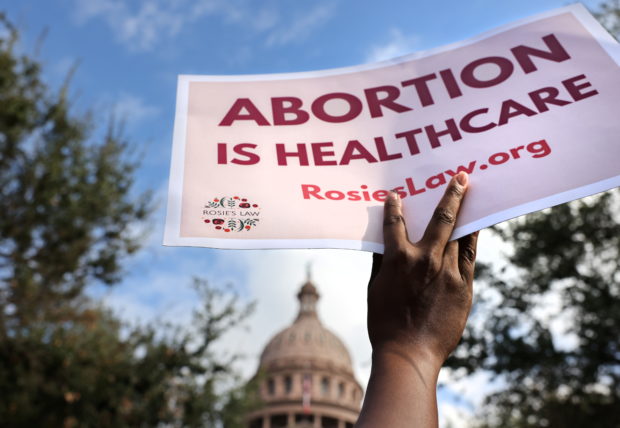In Texas, ‘sanctuary cities’ pass their own anti-abortion laws

A supporter of reproductive rights holds a sign outside the Texas State Capitol building during the nationwide Women’s March, held after Texas rolled out a near-total ban on abortion procedures and access to abortion-inducing medications, in Austin, Texas, U.S. October 2, 2021. REUTERS FILE PHOTO
Activist pastor
The idea of creating abortion-free communities belongs to Mark Lee Dickson, a former Baptist pastor in his mid-thirties who comes from a Texas family of anti-abortion activists. Wearing a baseball cap that is usually turned backward, Dickson started his campaign in 2019 in the town of Waskom, a small community on the state border with Louisiana. Dickson managed to convince local officials that an abortion clinic in the neighboring state was planning to relocate to their town. Even though the clinic denied any such plans, Waskom’s five municipal council members, all of them men, unanimously passed legislation that effectively prohibited abortions in their community. Since then, Dickson has been crisscrossing Texas, persuading local municipalities to follow suit — with success. Dozens of communities have declared themselves abortion-free sanctuaries and about twenty other cities are considering the measure, according to the American Civil Liberties Union (ACLU), one of the country’s leading human rights organizations. Similar efforts are underway in the states of Ohio and Michigan. “They are going to continue to do this until there is no access to abortion at all. That is their goal. Let’s be very clear about that,” said Blair Wallace, a policy and advocacy strategist with the ACLU of Texas. “They don’t want it to be ‘abortion is banned after six weeks.’ They want abortion to be overturned as a right, altogether and they will do that in every way that they know how.” Dickson, who now works at Texas Right to Life, an anti-abortion advocacy group, did not return AFP’s request for comment for this story.Deserts of care
Dyana Limon-Mercado, executive director of Planned Parenthood Texas Votes, a local chapter of America’s flagship family planning organization, said that access to abortion was already severely restricted in many of those small, conservative communities, so the issue of such “sanctuary cities” is more symbolic than medical. “It’s a political fight. You’re trying to take access away (from) people who already don’t have access,” Limon-Mercado told AFP. However, the situation is different in Lubbock, a city of around 250,000 people in northern Texas, where ranches are interspersed with endless agricultural fields. This spring, Lubbock residents voted in a referendum to turn their city into an abortion-free sanctuary, in a victory for Dickson and his allies. “There were all these huge churches that were actively campaigning for this ordinance,” said the ACLU’s Wallace. “And that’s just something we really can’t combat. That’s really difficult to combat that.” As a result, Planned Parenthood had to stop performing abortions in their Lubbock clinic, which they had opened six months earlier after years of preparation. Thus, Lubbock has turned into what abortion rights activists call a medical desert, with the nearest abortion clinic almost a five-hour drive to the closest big urban center in Texas or a clinic in the state of New Mexico. “Texas is giant,” said Wallace. “So you have clusters of clinics and you have huge deserts of care.”
READ NEXT
EDITORS' PICK